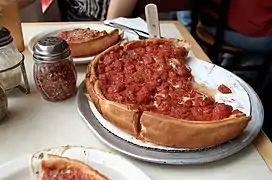Pizza in the United States
Numerous regional variations of pizza in the United States have been developed, with many bearing only a casual resemblance to the Italian original. Pizza became most popular in America after soldiers stationed in Italy returned from World War II.[2] During the latter half of the 20th century, pizza became an iconic dish of considerable popularity in the United States. The American slang term za can also refer to pizza.[3] The thickness of the crust depends on what the consumer prefers; both thick and thin crust are popular. Often, foods such as barbecued chicken and bacon cheeseburgers are used to create new types of pizza.
| Part of a series on |
| Pizza |
|---|
 |
Pizza is a popular fast food item. The United States pizza restaurant industry is worth $37 billion,[4] and has an organized industry association.[5] Pizza is normally eaten hot (typically at lunch or dinner), but is sometimes eaten as cold leftovers, even for breakfast.
Ingredients
American pizza often has vegetable oil or shortening mixed into the dough; this is not as common in Italian recipes (for example, the pizza dough recipe in the influential Italian cookbook Il cucchiaio d'argento does not use oil). This can range from a small amount in relatively lean doughs, such as New York style, to a very large amount in some recipes for Chicago-style deep-dish dough. In addition, American pizza (at least thin-crust) is often made with a very high-gluten flour (often 13–14% protein content) of the type also used to make bagels; this type of flour allows the dough to be stretched rather thinly without tearing, similar to strudel or phyllo.
In some pizza recipes, the tomato sauce is omitted (termed "white pizza"), or replaced with another sauce (usually garlic butter, but sauces can also be made with spinach or onions).
| Popular cheeses commonly used by U.S. pizzerias[6] | |
|---|---|
| Mozzarella | Used by the vast majority of pizzerias, usually a low-moisture variety. Less often it is mixed with other cheeses. |
| Provolone | Second most popular cheese after mozzarella. Some U.S. pizzerias mix it with low-moisture mozzarella, while a few are said to use only provolone. |
| Cheddar | Third in pizza-cheese popularity, and usually mixed with low-moisture mozzarella to preserve chewiness. |
| Parmesan (generic) | Parmesan, is a hard, aged cheese, available in a variety of moistures. U.S. pizzerias generally use generic imitation parmesan, not PDO Parmigiano-Reggiano. Parmesan is often pre-processed and sold in dehydrated, granular form. It generally has a sharp flavor. |
| Romano (generic) | Romano is another hard, aged cheese commonly used on pizza. The Italian Pecorino Romano is made from sheep milk; the commonly used U.S.-made imitations are made from cows' milk, with an enzyme added to simulate the sharper flavors of the original. |
| Ricotta | Ricotta is used on white pizzas and inside calzones. On white pizza, it may be used instead of tomato sauce. It is often covered with another cheese that melts better during baking and which holds the ricotta in place during consumption. |
Variations
- Altoona-style pizza is pizza that originated in Altoona, Pennsylvania at the Altoona Hotel in the 1960s and 70s.[7] The pizza is made on a Sicilian-style dough base and is cut into squares. The dough is overspread with a sweet tomato sauce, deli-style salami and a sliced green bell pepper ring and finally topped with a yellow cheese. The yellow cheese can vary but is usually yellow American cheese or Velveeta.[8]
- Bar pizza, also known as tavern pizza, is distinguished by a thin crust, almost cracker-like, and is cooked, or at least partly cooked, in a shallow pan for an oily crust. Cheese covers the entire pizza, including the crust, leaving a crispy edge where the cheese meets the pan or oven surface. Bar pizzas are usually served in a bar or pub and are usually small in size (around 10" in diameter). This style of pizza is popular in the Boston area, particularly the South Shore, other parts of the northeast, the Chicago area, and the midwest.[9]
- California-style pizza is distinguished by the use of non-traditional ingredients, especially varieties of fresh produce. Some typical California-style toppings include Thai-inspired chicken pizza with peanut sauce, bean sprouts, and shaved carrots, taco pizzas, and pizzas with chicken and barbecue sauce as toppings.

- Chicago-style pizza is distinguished by a thick moist crust formed up the sides of a deep-dish pan and sauce as the last ingredient, added atop the cheese and toppings. Stuffed versions have two layers of crust with the sauce on top.[10][11][12]

- Detroit-style pizza is a square pizza similar to Sicilian-style pizza that has a thick deep-dish crisp crust and toppings such as pepperoni and olives, and is served with the marinara sauce on top. The square shape is the result of an early tradition of using metal trays originally meant to hold small parts in factories.
- Grandma pizza is a thin, square pizza, typically with cheese and tomatoes. It is reminiscent of pizzas cooked at home by Italian housewives without a pizza oven, and was popularized on Long Island.[13]
- Greek pizza is a variation popular in New England; its name comes from it being typical of the style of pizzerias owned by Greek immigrants. It has a thicker, chewier crust and is baked in a pan in the pizza oven, instead of directly on the bricks. Plain olive oil is a common part of the topping, as well as being liberally used to grease the pans and crisp the crust. A significantly different variation in other parts of the country includes using feta cheese, Kalamata olives, and Greek herbs such as oregano.
- New Haven-style pizza, also known as apizza (pronounced as "ah-beetz" in the local dialect), is popular in Connecticut. It has a thin crust that varies between chewy and tender, depending on the particular establishment. Apizza has a very dark, "charred" crisp crust that offers a distinctive bitter flavor, which can be offset by the sweetness of tomatoes or other toppings. A "plain" pizza has tomato sauce and no cheese besides grated Romano cheese; mozzarella cheese is considered a topping.[14] New Haven-style pizza is traditionally cooked in coal-fired brick ovens.[15]
- New York-style pizza is a style originally developed in New York City by immigrants from Naples, Italy, where pizza was created.[16] It is often sold in generously sized, thin, and flexible slices. It is traditionally hand-tossed, moderately topped with southern Italian-style Marinara sauce, and liberally covered with cheese essentially amounting to a much larger version of the Neapolitan style. The slices are sometimes eaten folded in half, as its size and flexibility may otherwise make it unwieldy to eat by hand. This style of pizza tends to dominate the Northeastern states and is particularly popular in New York, New Jersey, and Connecticut. Jumbo slices are particularly popular in Washington, D.C..
- Ohio Valley-style pizza is pizza that was developed in Steubenville, Ohio and has made its way up the Ohio River to Pittsburgh, PA. It uses a square pizza dough that rises thick but maintains a light consistency. The crust and bottom are crunchy. The sauce on this style of pizza is typically sweet and the pizza is baked with no toppings, including cheese. Immediately after being removed from the oven, the cold toppings are put on the hot pizza, including the cheese, in prodigious amounts. Most of the cheese melts, but not all. The other toppings used remain cold on top of the cheese.[17]
- Old Forge-style pizza is a variety of pizza from Old Forge, Lackawanna County, Pennsylvania. It is square-shaped and typically has a thick crust. The sauce often has onions in it and is sometimes a bit sweetened. It also often has unorthodox cheese mixes including cheeses such as American and Cheddar.[18]
- Pan pizza is cooked in a dish with sides. A variation of moderate thickness was popularized by Pizza Hut; deep-dish styles like Chicago and Detroit are considered by some to be varieties of pan pizza.

- Quad City-style pizza originates from the Quad Cities and is a thin crusted dough that incorporates a "spice mix" that is heavy on malt, which lends a toasted, nutty flavor. The smooth, thin sauce contains both red chili flakes and ground cayenne, and is more spicy than sweet. The sausage is a thick blanket of lean, fennel-flecked Italian sausage that is ground twice and spread from edge to edge.
- Sheet pizza is any thin-crust style baked on a baking sheet. It is typically rectangular (like the sheet) and served for events with a large number of people.
- Sicilian pizza in the United States is typically a square pie with a thick crust.[19][20] It is derived from Sfinciuni, a thick crust variety from Sicily, and was introduced in the US by early Sicilian immigrants. Sicilian-style pizza is popular in Italian-American enclaves in the Northeast, Metro Detroit, and Portland, Oregon.[20]
- St. Louis-style pizza is a variant of thin-crust pizza popular around St. Louis and southern Illinois notable for its use of distinctive Provel cheese instead of (or, rarely, in addition to) mozzarella. Its crust is thin enough to become very crunchy in the oven, sometimes being compared to a cracker, and toppings are usually sliced instead of diced. Even though round, St. Louis-style pies are always cut into small squares.
- Tomato pie, in several areas around the Northeast, especially Philadelphia and Utica, New York, refers to a square-cut thick-crust pizza topped with chunky tomato sauce and sprinkled with pecorino romano cheese, very similar to Sicilian sfinciuni. Also known as party pizza, pizza strips, gravy pie, church pie, red bread, strip pizza, and bakery pizza.
- Trenton tomato pie[21][22] or New Jersey tomato pie[23] is a type of circular thin-crust pizza named after Trenton, New Jersey.[24][25][26] In this style of pizza, the mozzarella and toppings are placed on the crust first, with tomato sauce on top.[22] Joe's Tomato Pie (now defunct), which opened in 1910, was the first restaurant to serve Trenton-style tomato pie. Papa's Tomato Pies, whose proprietor learned the trade at Joe's, was opened two years later in 1912.[27] The Trenton region is home to the two oldest New Jersey tomato pie restaurants in the United States, Papa's and De Lorenzo's.[24]
- Upside-down pizza, made with tomato sauce on top of the cheese.[28][29] Putting the cheese on the bottom prevents the tomato sauce from making the crust soggy.[30]
See also
References
- "Food Flash:Most popular pizza toppings". Nation's Restaurant News. October 5, 2011. Archived from the original on November 23, 2011. Retrieved September 18, 2012.
- Stradley, Linda. "Pizza - History & Legends of Pizza." What's Cooking America. N.p., n.d. Web. January 28, 2014.
- Webster's Editors (2005). Webster's 2 New College Dictionary. Houghton Mifflin Harcourt, ISBN 9780618396016
- "U.S. Pizza Industry Facts". American Pizza Community. Archived from the original on March 9, 2015. Retrieved March 5, 2015.
- Martin, Andrew. "Inside the Powerful Lobby Fighting for Your Right to Eat Pizza". Bloomberg Business. Bloomberg News. Retrieved March 5, 2015.
- John Correll. "Chapter 9 - Pizza Cheese". Archived from the original on July 25, 2011. Retrieved October 13, 2012.
- ""Altoona-style pizza" baffles the nation—including Altoona itself". The Takeout. Retrieved October 28, 2020.
- "Altoona Hotel Pizza: The slice with yellow cheese from Central Pa. you've never heard of". Retrieved October 28, 2020.
- "Chicago Thin Crust Pizza – Yes, it's a thing. | Real Deep Dish - Chicago Style Pizza Done Right". Real Deep Dish. July 13, 2014. Retrieved March 14, 2017.
- "Deep Dish Or Thin Crust? Even Chicagoans Can't Agree : The Salt". NPR. December 20, 2013. Retrieved March 14, 2017.
- Liz Barrett (August 17, 2016). "A Taxonomy of Pizza Styles in America - Bar/Tavern". First We Feast. Retrieved December 16, 2017.
- Adam Kuban. "Do You Know These Regional Pizza Styles?". Serious Eats. Retrieved December 16, 2017.
- Grandma Pizza: The full story - Feed Me (Newsday food blog)
- "Apizza, tomato pie - New Haven, Connecticut | Local Food Guide". Eatyourworld.com. Retrieved March 14, 2017.
- "The Definitive Guide to New Haven Pizza". Eater. March 18, 2014. Retrieved March 14, 2017.
- "New York Today: Our Past In Pizza". The New York Times.
- "Why Pittsburghers should brag about Ohio Valley Pizza". Pittsburgh City Paper. Retrieved September 20, 2019.
- "Pizza Capital of the World: Tasting Our Way Through Old Forge, PA". Retrieved November 2, 2016.
- "What is Sicilian Pizza?". WiseGeek. Retrieved April 14, 2013.
- Hulin, Brenda. "Classic Pizza Types". Netplaces. Archived from the original on May 15, 2013. Retrieved April 14, 2013.
- Karen L. Schnitzspahn (October 16, 2012). Jersey Shore Food History: Victorian Feasts to Boardwalk Treats. Arcadia Publishing Incorporated. pp. 131–. ISBN 978-1-61423-727-3.
- Capuzzo, Jill (January 12, 2010). "Trenton Tomato Pies Are Still A Staple of the New Jersey Pizza Scene". New Jersey Monthly. Retrieved November 29, 2017.
- "The Dish: Chef Tony Gemignani". cbsnews.com. Retrieved November 28, 2017.
- Joshua Lurie (June 23, 2008). "De Lorenzo's Tomato Pies: Trenton vs. Robbinsville". Retrieved April 12, 2012.
- DK (February 2, 2015). DK Eyewitness Travel Guide USA. DK Publishing. pp. 127–. ISBN 978-1-4654-3834-8.
- Scott Wiener (April 1, 2017). "The Trenton Tomato Pie". Pizza Today. Retrieved November 29, 2017.
- "A Slice of Heaven: American Pizza Timeline". slice.seriouseats.com. Retrieved October 28, 2020.
- Solares, Nick (March 21, 2014). "It's Hip to Be Square: 12 Great NYC Square Slices". Eater NY. Retrieved October 28, 2020.
- "How to Make Utica Style Pizza in 5 Easy Steps". Lite 98.7. Retrieved October 28, 2020.
- "New York Pizza Suprema". nypizzasuprema.com. Retrieved October 28, 2020.
Further reading
| Wikimedia Commons has media related to Pizzas in the United States. |
- Barrett, Liz. Pizza: A Slice of American History. Minneapolis, MN: Voyageur Press, 2014

